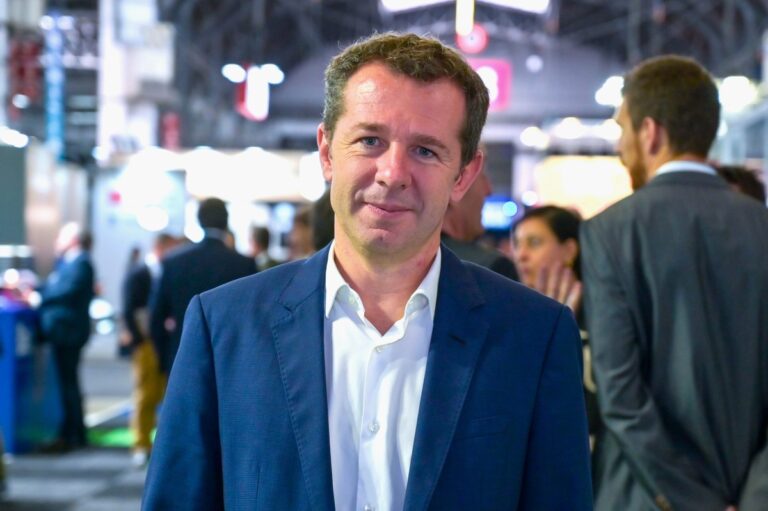Juan Velayos is president of the specialized real estate trade fair The District, which will be held in Barcelona from September 20 to 22. The executive is also a founder and partner of JV20 and a professor in several masters specialized in real estate. Velayos reviews the latest developments of an event that has placed the Catalan capital in the focus of the international real estate, despite being little “business friendly”. The executive also makes an assessment of the new government of Barcelona and what the PSC could achieve in the next four years of legislature.
He chairs The District real estate show in Barcelona. What is your role within the event?
The role of president is primarily to act as a bridge between the industry and the event while also having responsibilities at the institutional level as a representative of The District. For me it is a pleasure to contribute, with this role, to the development of the industry on an international scale, connecting great Real Estate leaders to come to Barcelona to learn about the challenges and megatrends of real estate, as well as to create new business opportunities.
The last few years have been a roller coaster ride in Barcelona. What is the real estate situation in the Catalan capital right now?
Barcelona, like the major European capitals, is currently in a changing and volatile situation as a result of inflation, EU monetary policy and rising interest rates. It is for these reasons that real estate investment at the end of 2023 is expected to fall between 20% and 30% in the city of Barcelona at a time marked by the readjustment of prices. With this in mind, it can be said that the Catalan capital has remained one of the poles of investment in Real Estate in Spain as a whole, just like Madrid, and that it maintains the interest of the international industry.
If we look at the housing asset, Barcelona continues to be considered a stressed area due to high demand from foreign investment, which will cause prices to fall by less than 1% in the coming months. This situation affects renting, since due to the loss of purchasing power and the increase in sale and purchase prices, the demand for leasing is increasing in a market where supply is scarce.
Likewise, ‘living’ has made an important step in the market of the Catalan capital, increasing the level by almost 30%, with outstanding assets such as student residences or buildings for rent; as well as industrial and logistics, which have burst in with 18% of the total.
Barcelona has just changed its mayor after 8 years with Ada Colau at the helm. What Barcelona has the former government left behind and what is the Barcelona you expect for the next four years in terms of real estate business?
One of the fundamental problems facing young people and families in the major capital cities is access to housing. With the change of legislature it is clear that we expect an evolution in the municipal ordinances that will help us to accelerate real estate investments with the aim of Barcelona regaining its leadership in the creation of residential opportunities. Failed operations such as the Four Seasons or the problematic Hermitage in Port Vell have been controversial and very mediatic points that have not contributed to the international projection of the city to stand out as ‘business friendly’.
“Colau has not given an international projection of the city to stand out as ‘business friendly’.”
Thus, our purpose is to support the economic and social development of the capital, with high-value congresses such as The District, with which this transformation that we believe has begun in Barcelona can be perceived. All of this, also attending to the demands and challenges of the citizens, such as the increase in affordable housing, which we cannot ignore because they are existing challenges that require a response from the real estate sector. In this sense, if the current municipal government proposes new rules, the private sector can help by contributing to the creation of 5,000 housing units during this legislature.
Constantly changing fiscal rules and instability have been key to international real estate investment looking the other way in recent years when talking about Barcelona. What is the feedback you are receiving from visitors to the congress?
The congress participants who attended last year’s The District already gave us a very positive assessment of the city in districts of interest, such as 22@, or in nearby and well-connected towns such as L’Hospitalet or El Prat de Llobregat. In this sense, the investors who have confirmed that they will attend the summit, and who represent leading companies such as Blackstone, King Street, Goldman Sachs or Stoneshield, also agree on the potential that the city has at this moment of repricing of the sector with bets for student residences, retail or shopping centers. At the same time, we trust that the new administration will be open to transactions that bring fresh air to Barcelona and recover the heartbeat of the capital, also taking into consideration current challenges such as gentrification.
Beyond Barcelona… Is 2023 proving to be as tumultuous a year as expected for the real estate business?
We could say that this 2023 is happening as expected, with some few significant operations and with a context marked by the decline in performance due to inflation and the rise in interest rates, which are expected to increase again in September. These factors are the main reasons for the slowdown of transactions in the real estate market and the fact that investors have adopted a ‘wait and see’ position, waiting for the sector itself to readjust.
However, we will see some projects starting in the last part of the year, although we will have to keep an eye on what happens in the United States, with the actions of the Federal Reserve, or with the ‘asset reconvention’ trends that we are observing in assets such as offices. For all these reasons, the appointment with The District in September is a must for the sector.
What are your forecasts for the real estate sector for the next two years?
The forecasts, and what we are working on from the sector as a whole, is to reach stabilization in 2024. In line with the ECB’s indications, the inflation outlook will be on a downward trend in the coming months to reach the desired 2% by the end of 2024. This move will bolster GDP growth in Europe, which will pick up as household income recovers and external demand strengthens. In this respect, the euro zone economy is expected to grow by more than 1.5% in 2025, contributing to a sustained maintenance of the real estate market by ensuring the momentum of transactions.
In turn, we expect financing costs to fall in the coming year, allowing demand to increase and the sector to become more dynamic. Investors interested in the European market from other economies, such as Asia, who are already intervening in decision-making cities such as London, will also impact the industry and make stabilization more effective.
In terms of investment, is Spain more interesting now than before?
According to data managed by the sector, Spain in 2023 has risen to fourth place in the list of the most interesting European countries to invest in real estate, only surpassed by the United Kingdom, Germany and France. The innovation hub that different areas of Spain have become, added to the cultural and tourist attraction of the country, has led the territory to attract more international real estate capital and to become a region of interest for investment companies that lead Real Estate operations.
“We are convinced that carrying out the Housing Act in this way is a mistake.”
If we focus on the asset classes to which investors pay most attention, we find that living is the one they bet on the most, with a high interest in residential rental and student residences. Likewise, hospitality and retail recorded good operations last year, as did industrial and logistics. This indicates that the strong business and industrial fabric that we have, as well as the high demand for housing, are powerful assets in which Spain is a leader and in which capital finds profitability.
Although it is true that real estate is a slow and cyclical sector, there are still external agents that alter it directly. What is your opinion of the Housing Law?
This is an issue that closely touches multiple actors within society, so as a public issue it always generates some controversy when it is analyzed. From the sector’s point of view, the projected Housing Law will have an impact on investment, especially due to the regulation of the rental market. In fact, the issue of renting and the limits that will be established will be a topic that we will discuss in depth in The District, due to the concern that it has created at a structural level in the industry.
On the other hand, the regulations promote the development of and access to affordable housing for people with low incomes, something that must be implemented with a consistent capital structure. Thus, everything points to the fact that there will have to be a public-private partnership to move social projects forward.
What effects do you think it will have in the medium term on businesses such as residential investment in Spain?
While we may agree with some of the objectives of the Housing Law, especially that young people and families can have access to more affordable housing, we are convinced that the way it is being implemented is a mistake. Increasing the housing stock is essential. By wanting to limit prices we are already observing that what we are achieving is the disappearance of rental supply and capital in investment.


